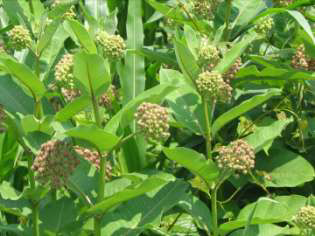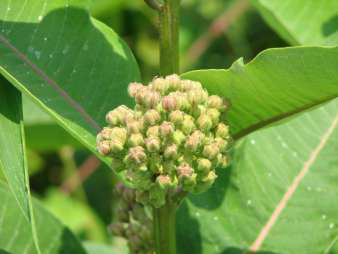 Common Milkweed
Common Milkweed
(Asclepias syriaca L.)
|
Classification |
| Kingdom: |
Plantae |
| Division: |
Magnoliophyta |
| Class: |
Magnoliopsida |
| Order: |
Gentianales |
| Family: |
Apocynaceae |
| Genus: |
Asclepias |
| Species: |
syriaca |
 Characteristics: The common milkweed is a tall downy plant, ranging 2 to 6 feet in height. It has purple to pink flower clusters, which are approximately 2 inches wide and appear in the spring. The leaves are opposite and 4 to 10 inches in length; they are light green with grayish down beneath and produce a milky sap when damaged. The seed pods are rough in texture, opening along the side, and producing overlapping seeds with tufts of silky hairs.
Characteristics: The common milkweed is a tall downy plant, ranging 2 to 6 feet in height. It has purple to pink flower clusters, which are approximately 2 inches wide and appear in the spring. The leaves are opposite and 4 to 10 inches in length; they are light green with grayish down beneath and produce a milky sap when damaged. The seed pods are rough in texture, opening along the side, and producing overlapping seeds with tufts of silky hairs.
Habitat: Milkweed grows well in old fields, waste places, and roadsides.
Range: It can be found from Canada to Georgia, west to Texas, and up through North Dakota.
Native American Uses: Milkweed was used as a painkiller, a pulmonary aid, and to treat diarrhea. In addition, fibers from the stems were utilized to make belts and the roots were ingested to treat rheumatism and pleurisy. Milkweed roots were also used to make a drink that was given to women after childbirth. Finally, a poultice from crushed leaves that was used to treat snakebites. The Cherokee, Delaware, and Rappahannock Indians were among the Native American tribes to utilize the milkweed.
Modern Uses: Milkweed plants contain chemicals, cardiac glycosides, which make the plant toxic herbivores. However, it is consumed by Monarch Butterfly larvae and is sequestered within the organism, causing the butterflies to be toxic to predators as well. These cardiac glycosides have been used in treating some forms of heart disease.